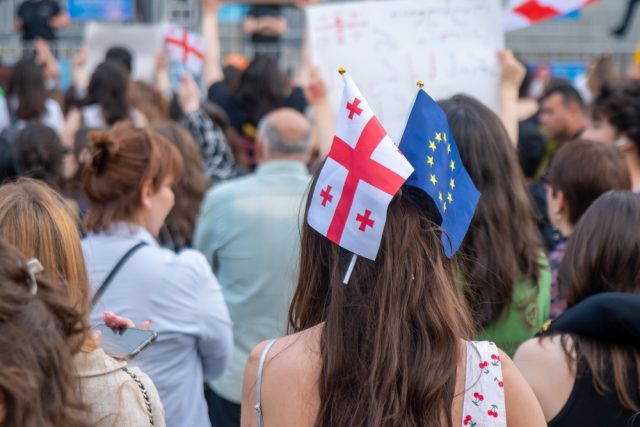
Georgia is back in the international spotlight as Mikheil Kavelashvili is sworn in as the new president in a climate of political and social tension. In the heart of Tbilisi, more than 2,000 protesters filled the streets, waving EU flags and demanding a sharp change in the country’s political direction. Accusations of pro-Russianism aimed at the ruling Georgian Dream party fueled the anger of a public that looks to Brussels and NATO as bastions of democracy and security.
Zurabishvili’s combative farewell. Outgoing President Salome Zurabishvili left the presidential palace, but not without sending a strong message to Georgians: “I still consider myself the legitimate head of state and will continue to fight for Georgia’s future. Six years ago, I swore allegiance to the Constitution and the people. This loyalty will not change, inside or outside the palace. Words that resonate as a call to resistance against a system that many see as increasingly vulnerable to pressure from Moscow.
The demonstrations in Tbilisi are the latest act in weeks of mobilization against Kavelashvili’s election last December 14 amid allegations of fraud and manipulation. The former soccer player-turned-politician represents continuity with a government that many accuse of undermining Georgia’s European aspirations. Protesters are demanding the annulment of October’s parliamentary vote and a clear commitment to integration with the European Union and the Atlantic Alliance.
Situated between Europe and Asia, Georgia is experiencing an identity conflict that places it at the center of rivalries between the West and Russia. Since the collapse of the Soviet Union, the country has sought to distance itself from Moscow’s influence, signing an association agreement with the EU in 2014 and gradually moving closer to NATO. However, the presence of Russian troops in the occupied territories of Abkhazia and South Ossetia remains an insurmountable obstacle on the country’s path to the Atlantic Alliance.
Georgian Dream, in government, professes to be in favor of European integration, but its actions are often criticized as ambiguous. The party seeks to balance relations with the West without provoking a hostile reaction from Russia, a balance that many consider too timid.
The United National Movement (MNU), the main opposition force, represents the strongest front against NATO and the EU. Heir to former President Mikheil Saakashvili, the party is pushing for radical reforms and greater international pressure against Russian expansionism.
Against this backdrop of high tension, Moldovan President Maia Sandu expressed her support for Georgia: “Moldova today, as always, stands with the Georgian people in their struggle for freedom, democracy and a European future.” A statement that takes on added weight after Russia cut off gas supplies to Moldova, a move many interpreted as punishment for its pro-European stance.
Georgia appears increasingly divided between those who dream of a future in Europe and those who fear the consequences of open confrontation with Russia. Internal political polarization and economic difficulties threaten to slow an already complex process, while Moscow continues to exert destabilizing pressure. The country is at a crossroads: will it succeed in consolidating its democracy and strengthening its Western alliances, or will it remain trapped in Russia’s sphere of influence?
The protests in Tbilisi are a clear signal: the Georgian people are not ready to give up their European dreams. But the road to Brussels and Washington is still long and full of obstacles.
Georgia is a parliamentary republic with a multiparty system. The political scene is dominated by two main formations: the Georgian Dream and the United National Movement (MNU), although other smaller parties have a significant presence. Georgia’s domestic politics are often characterized by intense polarization, which is also reflected in foreign policy issues.
European integration has been a major goal of Georgian policy since independence in 1991. Georgia signed an Association Agreement with the EU in 2014, including a free trade zone. However, the road to membership remains long and complex.
Georgian Dream (SG): The ruling party professes to be in favor of European integration. However, it has often been accused by the opposition and international actors of failing to implement the reforms necessary to meet the standards required by the EU. Some critics argue that the SG uses pro-European rhetoric to consolidate domestic power without a concrete commitment to democratization.
United National Movement (UNM): The opposition sees EU membership as a priority goal and accuses the SG of undermining the country’s European future. The MNU, the political heir to Mikheil Saakashvili’s government, is seen as more proactive in promoting reforms demanded by the EU. Other parties, such as Lelo for Georgia and the liberal movements, strongly support EU membership, seeing it as key to economic development and national security.
NATO membership is another stated priority of Georgian foreign policy. Cooperation with the Atlantic alliance has increased since the 2008 war with Russia, but the accession process is hampered by the presence of Russian troops in the occupied territories of Abkhazia and South Ossetia.
Georgia faces many challenges on its path to Western integration. Domestic polarization hinders the implementation of meaningful reforms, while Russia continues to exert destabilizing pressure. The European Union and NATO, while recognizing the country’s progress, have taken a cautious approach, mindful of the geopolitical implications of further eastward expansion.
Georgia’s political situation is a delicate balance between aspirations to the West and pressure from Russia. While public opinion seems to strongly support the path towards the EU and NATO, internal political divisions and economic difficulties are significant obstacles. The country’s future will depend on the ability of the Georgian leadership to overcome these challenges and consolidate its relations with the West without jeopardizing internal stability.



 Subscribe
Subscribe